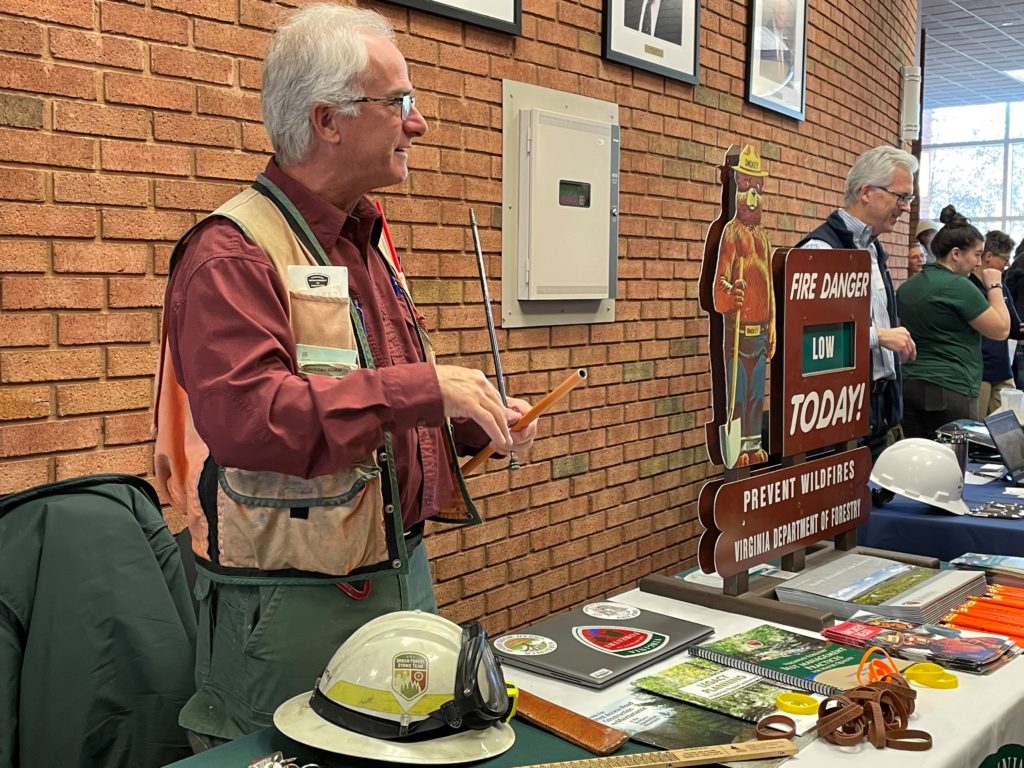“We’re here for you. The adults in the room care about your future.”
With this opening, Clean Valley Council Executive Director Courtney Plaster invited dozens of high school students on a journey at the council’s 23rd Earth Summit, which took place on Friday, Nov. 18, 2022, on the Virginia Western Community College campus.
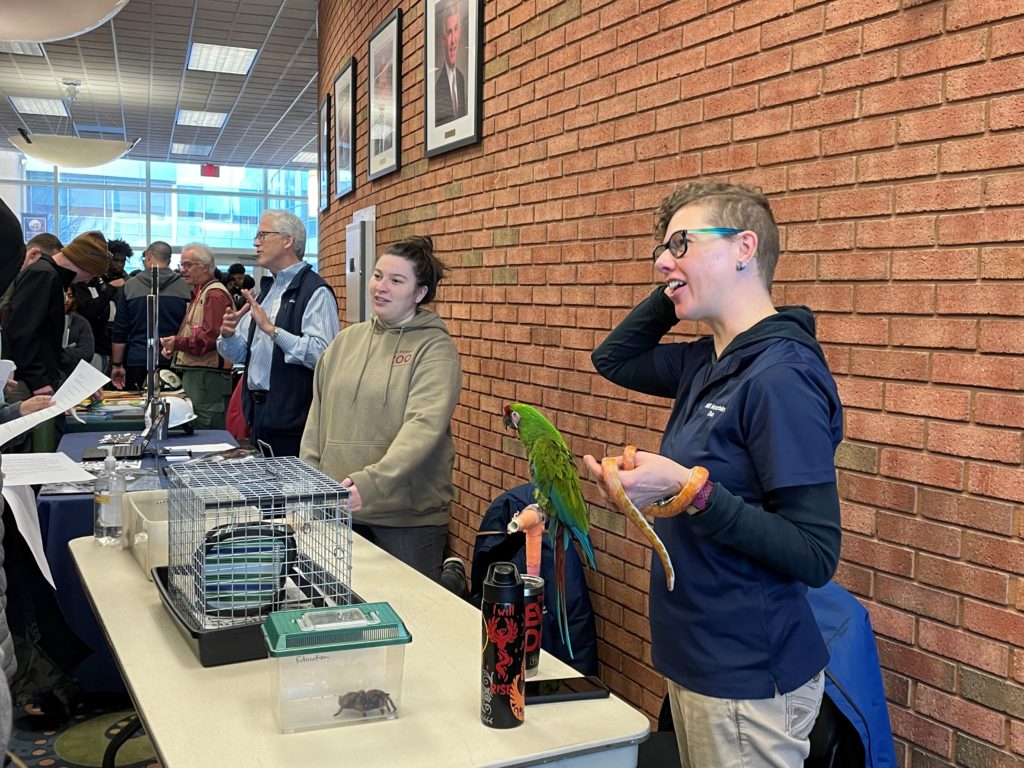
Groups from William Fleming, Patrick Henry and William Byrd high schools began their day on a networking scavenger hunt, milling around tables outside Whitman Auditorium. Their hunt included asking questions of presenters from the CodeVA organization, Mill Mountain Zoo, Titan America, the Virginia Department of Forestry, Virginia Western and Clean Valley Council.
Mill Mountain Zoo’s animal ambassadors pulled in a lot of interested students, who gleaned information about Rita, a military macaw; Axel, a box turtle; Ben, a chinchilla; Ziggy, a corn snake that spent part of the morning wrapped around the hand of Education and Conservation Manager Bambi Godkin; and Seraphine, a Mexican fireleg tarantula.
Titan America was the only manufacturer among the tables, noted Corporate Environmental Director Mark Aguilar. He spoke with students about the “spectrum of career tracks” available in his industry that might not come to mind immediately, including biologists and environmental engineers.
At his table, Denny McCarthy from the Virginia Department of Forestry demonstrated growth patterns of trees, and shared about particular aspects of urban trees, which might grow quickly because they are not competing for sunlight but also face challenges to their root systems.
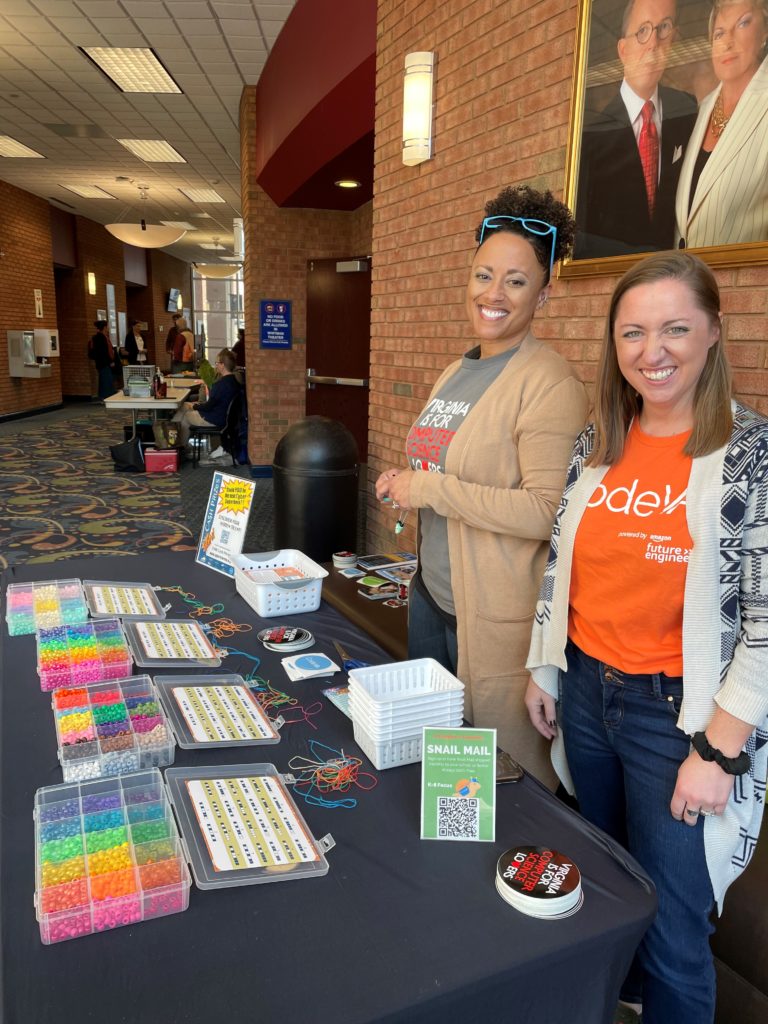
Kristen Franklin (left) and Megan Graybill with the nonprofit CodeVA organization connected with students with a hands-on activity, Binary Beads. Each letter of the alphabet is represented by eight pulses in which electricity is either on or off; to visualize that, students could use beads in two colors and a key to the alphabet to make a bracelet with their initials.
Heather Butler, Assistant Professor of Biology and Program Head for Science at Virginia Western, saw ways this scavenger hunt set the stage for the day. “Students had to step outside their comfort zones to ask questions, and this seemed to make them more comfortable interacting as the morning progressed,” she said.
Virginia Western Dean of Science, Technology, Engineering and Mathematics Amy White counseled students how to approach what they would uncover at the summit. “Please ask questions, and when you leave here today, keep asking questions.”
Through the summit, Clean Valley Council and Virginia Western “wanted the students to gain a stronger appreciation for and awareness of natural systems in our region such as watersheds, and native plant and animal associations,” Butler said. Other goals were that the students would:
- learn ways they can support and protect these natural systems in their own yards, neighborhoods and the broader community;
- have conversations with professionals whose careers involve directly studying, managing and protecting our natural resources, and how they can potentially develop their own careers in these fields;
- have an increased awareness of academic programs offered at Virginia Western that could help the students work toward careers in sustainability and environmental resource management.
The summit divided students into six groups, and each group rotated through a track of three 30-minute workshops, which touched on sustainability topics and career exploration.
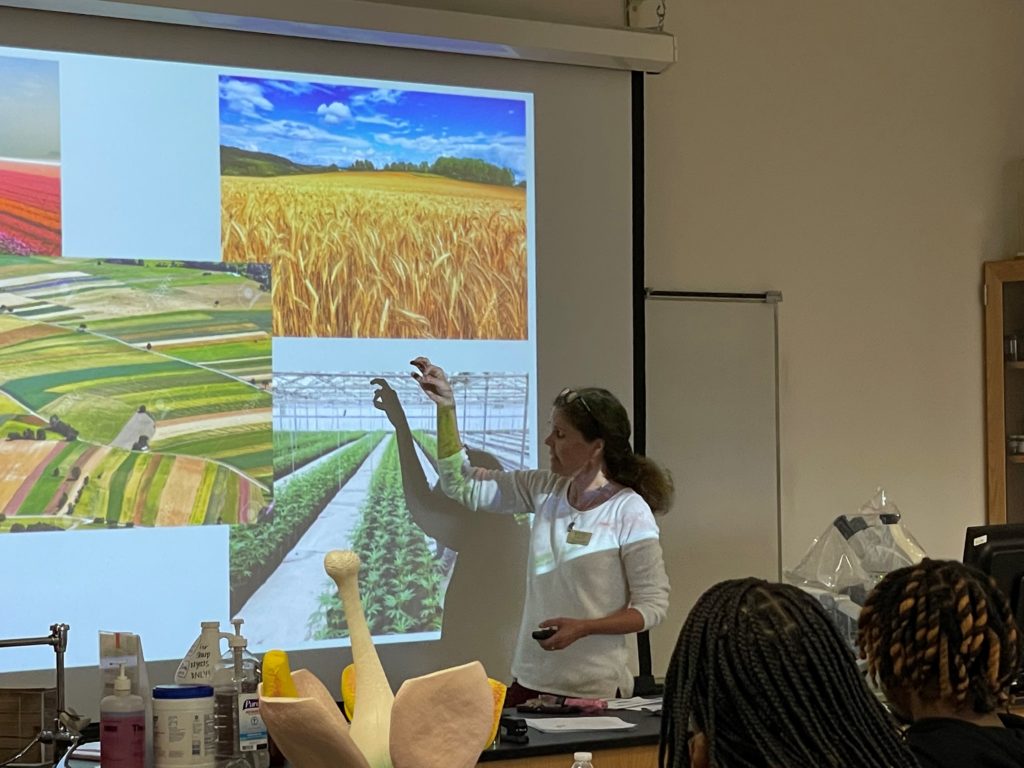
In her session, Butler expanded on statistics people might have heard about the decline of bees, butterflies and other pollinators. “Think of flowers as landing pads,” she told the students, when showing how it could be harder for pollinators to reach pollen in cultivated roses than in wild varieties. Native pollinators don’t know what to do with perfect lawns and have been found to fare better in overgrown urban environments. She gave handouts that outlined how to make your yard pollinator-friendly with native plants, encouraging them to “start small – one plant at a time – and don’t let it stress you out.”
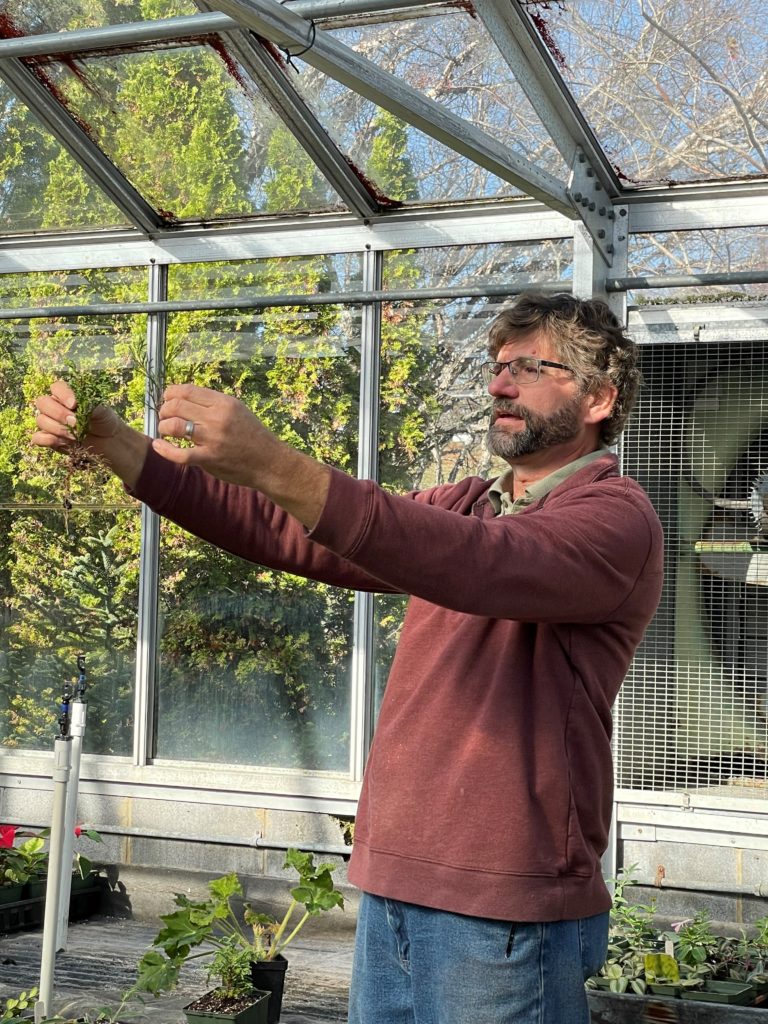
Students engaged in multi-sensory learning during the session led by Clark BeCraft, coordinator of Virginia Western’s Horticulture Program and Community Arboretum, about sustainable plant propagation. With tubs filled with soil in the College’s Natural Science Center, BeCraft showed how materials such as construction by-products and coconut fibers are being tested to use in soil, in order to be more sustainable because peat moss is depleting. Moving to the greenhouse, he demonstrated examples of cuttings that Virginia Western students made to propagate plants.
Engineering faculty member Dr. Daniel Brogan walked students through a Virginia Tech case study of wild crayfish to illustrate the importance of data for understanding watersheds. “You need data to answer questions,” he said, showing time-lapse video of a creek and corresponding pH levels of the water observed in a 2016 incident. He invited students to suggest reasons for unusual crayfish activity and subsequent crayfish deaths amid elevated pH levels on a certain day, illustrating how research is ongoing. For those interested in watershed monitoring, he shared the monitoring page he created for the Upper Roanoke River Watershed.
Virginia Western students helped guide the high schoolers through the workshop tracks. Butler said this benefited the college students as well. “This turned out to be a great opportunity for our five student volunteer group leaders,” she said. “I chose students who are pursuing degrees in natural resources, and most of them had not met anyone in those fields. This was the first day they were able to network with managers from the Virginia Department of Forestry, the Department of Environmental Quality, and the Department of Wildlife Resources ― three state agencies in one event. They learned what type of jobs those agencies offer and what types of degrees they are looking for. All three agency representatives shared their business cards with the students and offered to stay in touch regarding internships and career opportunities.”
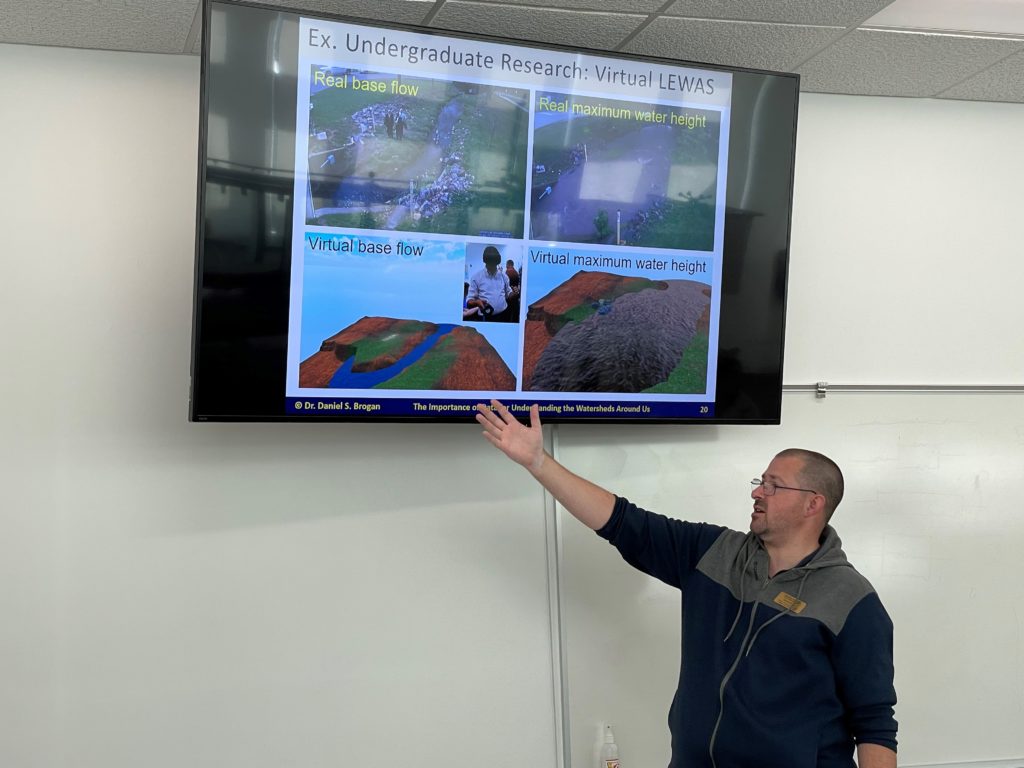
Students wrapped up their day with box lunches from Chicken Salad Chick and lemonade from Charlee Tropical Italian Ice and Drinks, along with local pears and apples to take home made possible through LEAP (Local Environmental Agriculture Project).
Clean Valley Council states that its mission “is to encourage environmental stewardship and lead the way towards a sustainable tomorrow by educating and inspiring those around us.”
At the summit, students received that encouragement to be inquisitive and concentrate on finding a passion that could in turn help improve the environment around them. “Think about career options that matter,” Clean Valley Council Director of Programs Dr. Marc Lucht told them. “We can make a difference that can help us all.”
RVTV3 filmed this video from the 2022 Clean Valley Council Earth Summit.
2022 Earth Summit presenters and workshops
Workshop Sequence 1
- “The Importance of Pollinators, and How to Make Your Yard and Neighborhood Pollinator-friendly,” Heather Butler, Virginia Western
- “The Importance of Data for Understanding the Watersheds Around Us,” Daniel Brogan, Virginia Western
- “Mammals of Virginia and their Conservation Success Stories,” Sarah Peltier, Virginia Department of Wildlife Resources
Workshop Sequence 2
- “Water Quality Monitoring, A Career in Environmental Science,” Aerin Doughty, Virginia Department of Environmental Quality
- “Plants from Plants: Sustainable Plant Propagation,” Clark Becraft, Virginia Western
- “Exploring the Diverse Skill Sets of Sustainability,” Adam Schellhammer, Valley Conservation Council
